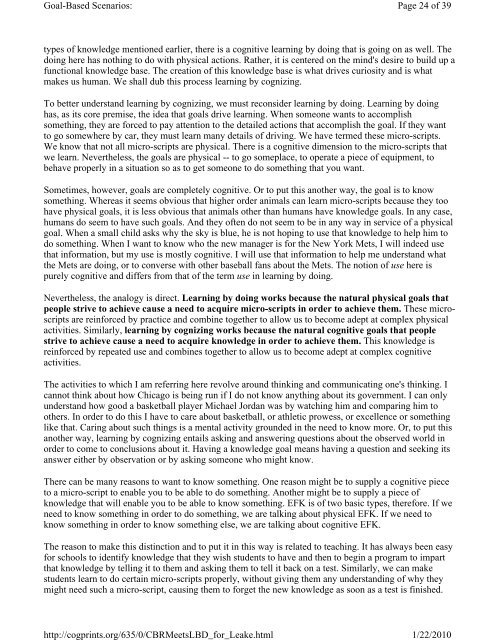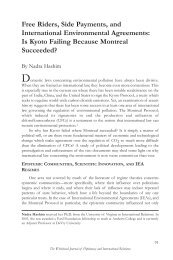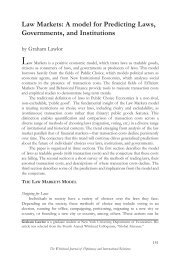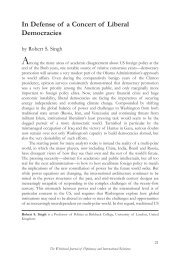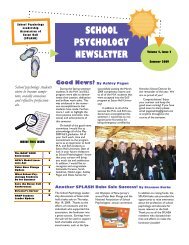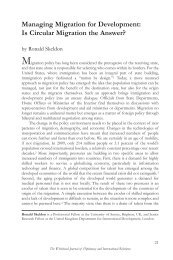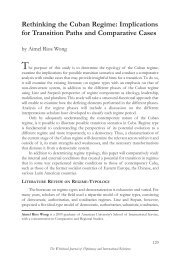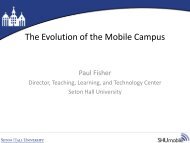Case-Based Reasoning Meets Learning by Doing
Case-Based Reasoning Meets Learning by Doing
Case-Based Reasoning Meets Learning by Doing
Create successful ePaper yourself
Turn your PDF publications into a flip-book with our unique Google optimized e-Paper software.
Goal-<strong>Based</strong> Scenarios:<br />
Page 24 of 39<br />
types of knowledge mentioned earlier, there is a cognitive learning <strong>by</strong> doing that is going on as well. The<br />
doing here has nothing to do with physical actions. Rather, it is centered on the mind's desire to build up a<br />
functional knowledge base. The creation of this knowledge base is what drives curiosity and is what<br />
makes us human. We shall dub this process learning <strong>by</strong> cognizing.<br />
To better understand learning <strong>by</strong> cognizing, we must reconsider learning <strong>by</strong> doing. <strong>Learning</strong> <strong>by</strong> doing<br />
has, as its core premise, the idea that goals drive learning. When someone wants to accomplish<br />
something, they are forced to pay attention to the detailed actions that accomplish the goal. If they want<br />
to go somewhere <strong>by</strong> car, they must learn many details of driving. We have termed these micro-scripts.<br />
We know that not all micro-scripts are physical. There is a cognitive dimension to the micro-scripts that<br />
we learn. Nevertheless, the goals are physical -- to go someplace, to operate a piece of equipment, to<br />
behave properly in a situation so as to get someone to do something that you want.<br />
Sometimes, however, goals are completely cognitive. Or to put this another way, the goal is to know<br />
something. Whereas it seems obvious that higher order animals can learn micro-scripts because they too<br />
have physical goals, it is less obvious that animals other than humans have knowledge goals. In any case,<br />
humans do seem to have such goals. And they often do not seem to be in any way in service of a physical<br />
goal. When a small child asks why the sky is blue, he is not hoping to use that knowledge to help him to<br />
do something. When I want to know who the new manager is for the New York Mets, I will indeed use<br />
that information, but my use is mostly cognitive. I will use that information to help me understand what<br />
the Mets are doing, or to converse with other baseball fans about the Mets. The notion of use here is<br />
purely cognitive and differs from that of the term use in learning <strong>by</strong> doing.<br />
Nevertheless, the analogy is direct. <strong>Learning</strong> <strong>by</strong> doing works because the natural physical goals that<br />
people strive to achieve cause a need to acquire micro-scripts in order to achieve them. These microscripts<br />
are reinforced <strong>by</strong> practice and combine together to allow us to become adept at complex physical<br />
activities. Similarly, learning <strong>by</strong> cognizing works because the natural cognitive goals that people<br />
strive to achieve cause a need to acquire knowledge in order to achieve them. This knowledge is<br />
reinforced <strong>by</strong> repeated use and combines together to allow us to become adept at complex cognitive<br />
activities.<br />
The activities to which I am referring here revolve around thinking and communicating one's thinking. I<br />
cannot think about how Chicago is being run if I do not know anything about its government. I can only<br />
understand how good a basketball player Michael Jordan was <strong>by</strong> watching him and comparing him to<br />
others. In order to do this I have to care about basketball, or athletic prowess, or excellence or something<br />
like that. Caring about such things is a mental activity grounded in the need to know more. Or, to put this<br />
another way, learning <strong>by</strong> cognizing entails asking and answering questions about the observed world in<br />
order to come to conclusions about it. Having a knowledge goal means having a question and seeking its<br />
answer either <strong>by</strong> observation or <strong>by</strong> asking someone who might know.<br />
There can be many reasons to want to know something. One reason might be to supply a cognitive piece<br />
to a micro-script to enable you to be able to do something. Another might be to supply a piece of<br />
knowledge that will enable you to be able to know something. EFK is of two basic types, therefore. If we<br />
need to know something in order to do something, we are talking about physical EFK. If we need to<br />
know something in order to know something else, we are talking about cognitive EFK.<br />
The reason to make this distinction and to put it in this way is related to teaching. It has always been easy<br />
for schools to identify knowledge that they wish students to have and then to begin a program to impart<br />
that knowledge <strong>by</strong> telling it to them and asking them to tell it back on a test. Similarly, we can make<br />
students learn to do certain micro-scripts properly, without giving them any understanding of why they<br />
might need such a micro-script, causing them to forget the new knowledge as soon as a test is finished.<br />
http://cogprints.org/635/0/CBR<strong>Meets</strong>LBD_for_Leake.html<br />
1/22/2010


